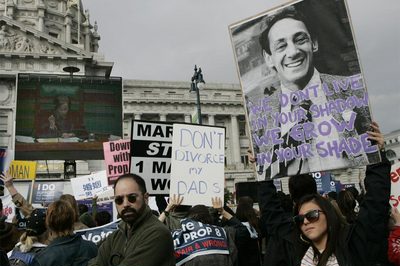SAN FRANCISCO — California gay-rights activists are at odds over when to ask voters to repeal the state’s same-sex marriage ban, with one of the largest groups saying it needs until 2012 to put together a winning campaign and two others saying they plan to go to the polls next year.
For months, organizers have been weighing the best strategy for gaining back marriage rights for gay and lesbian couples following their devastating loss last fall, when voters passed Proposition 8, banning same-sex nuptials just months after the California Supreme Court ruled to allow them.
Outrage at the defeat caused gay-rights activists to spill into the streets, their anger galvanizing supporters in California and elsewhere to push forward.
Yet at the same time, a rift developed among California activists, with critics claiming the failed “No on 8” campaign had focused too intensely on liberal enclaves along the coast and did not effectively reach more conservative areas of the state, or minorities.
Equality California, which led the “No on 8” charge, said last week that holding off until 2012 gives organizers more time to raise money and win over residents in those conservative areas. The group also said turnout in a presidential election year will be higher than in next year’s gubernatorial race and will include more young people who tend to favor gay marriage.
“Emotionally, we all want to win marriage back as quickly as possible,” said Marc Solomon, Equality California’s marriage director. “We really think that we have a shot in the next three years. But we have one shot, we don’t have two shots. We’re not waiting at all. We’re going hard. But we think the campaign is a three-year campaign.”
Meanwhile, Los Angeles-based Courage Campaign announced in an e-mail to supporters last Wednesday it would push to get a measure on the 2010 ballot. And John Henning, head of Love Honor Cherish, said his group also would continue to focus on next year.
“If you tell people that they’re going to have to wait, a lot of people are going to lose interest,” Henning said. “They’re going to make other commitments, they’re going to get the message that this isn’t important enough to act now.”
The anger over losing marriage rights — as well as the momentum from legalization in New Hampshire, Connecticut, Vermont and Iowa — have been strong arguments to launch the earliest campaign possible.
Even Equality California was eyeing 2010 immediately after Prop. 8 passed with 52 percent of the vote.
But Solomon said recent interviews with donors, sympathetic clergy, political consultants and organizations that work with gay families advised waiting for 2012.
He said it was unrealistic to quickly raise the needed cash — likely $40-$50 million — in a bad economy, especially when big donors are being asked to give to social-service organizations whose budgets have been slashed.
The 2008 fight cost supporters and opponents $83 million.
Both Equality California and the Courage Campaign allowed for a possible change in strategy. Solomon said he would not rule out playing a role if an initiative does make it to the ballot next year.
And Courage Campaign Chairman Rick Jacobs said before his group can take the battle in California to voters, it must help other states fighting to legalize same-sex marriage, including Maine, which became poised to recognize the unions when lawmakers in May set aside a state law defining marriage as between a man and a woman.
Gay-marriage opponents want to force a November vote in Maine to outlaw the nuptials, and Jacobs said the Courage Campaign needs to be involved in that fight.
Voters in 29 states have approved state constitutional amendments that ban gay marriage.
Meanwhile, an effort to legalize gay marriage in California is also playing out in federal court. Last Wednesday, U.S. District Judge Vaughn Walker in San Francisco said he is dissatisfied with all the court filings meant to lay out the important legal issues and key evidence, and ordered new submissions with more details.
Associated Press writers Lisa Leff and Paul Elias contributed to this report.
